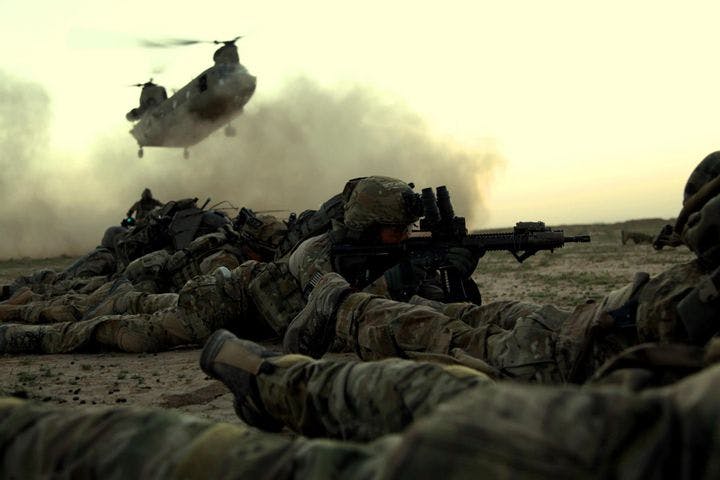Summer 2014
“I heard the screams for medic. This was on Mother's Day.”
– Zack Stanton
U.S. veterans give their firsthand stories of life & war in Afghanistan.
The following stories are made possible thanks to the generosity and hard work of the Veterans History Project at the Library of Congress.
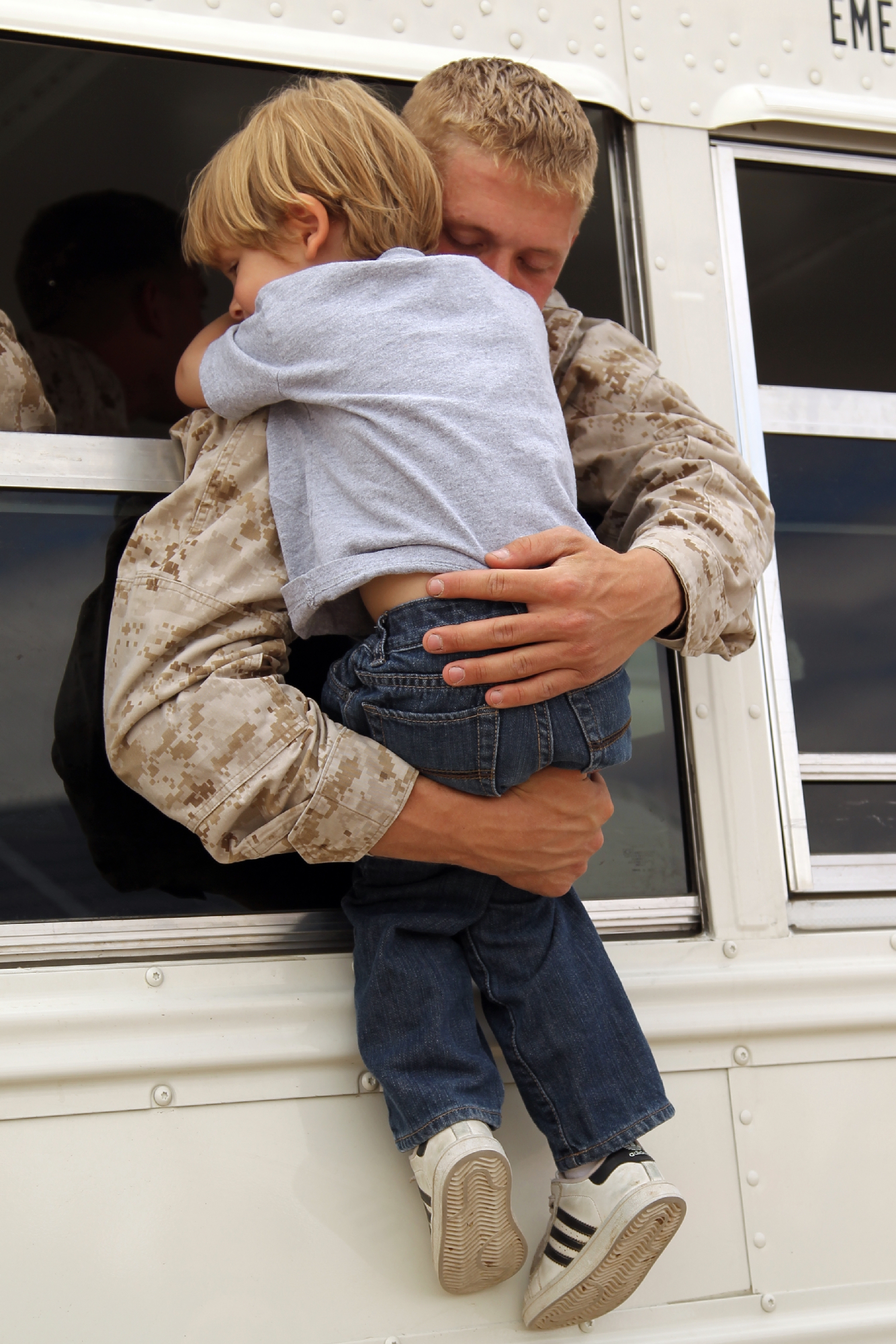
Why They Volunteered
John Hintz
[On September 11, 2001] I was standing in my living room trying on a tuxedo. My wedding was to be four days later. My family had just arrived in town. So here I am in last preparations, rehearsals for a wedding. The following day we were to get our wedding license. And I'm standing in the living room, tuxedo on, TV on, when I saw that occur...
I think every American can remember to a T exactly what they were doing, and I know I can. I can remember the color of the carpet. I mean, I can remember every ounce of that moment.
I just never thought that I would see in my lifetime something like that. I'd seen the things that had occurred in Pearl Harbor, and to me that was unbelievable, but to see it in New York City — I always thought something could happen because there’s been numerous attempts at those kind of things, but never to that scale. …
[My wife] knew the minute it happened, she knew when 9/11 happened that I was going back. I mean, there was no discussion about it first. She just knew it. And I still had the uniforms in my closet, so it was a very easy thing for me to do. And I was in by the first of the year. It was quick.
James Martin Grace, Jr.
You know, in my 20s and my 30s I regretted not serving. ... I had some friends who were doing something called a ‘direct commission officer program.’ And this is a program that the Navy has in order to encourage disciplines and expertise ... to join the military. You get commissioned right away.
I had some friends who were in it, but you had to get in before you turned 40. And literally two days before I turned 40, September 4th, 2007, my recruiter calls me and says, “Do you turn 40 on the 6th?” I said, “Yes.” He said, “Your birthday on the 6th?” And I said, “Yes.” He said, “You need to come over here tomorrow and we need to get you sworn in. Because we wait one more day, you can't get in.” ...
So that's how I got in. So that was, you know, literally the day before. I like to tell people it's my midlife crisis.
Michelle, when I first joined, she was supportive in the sense that she didn’t — she knew how important it was to me. I mean, she knew how I really regretted not serving, you know, when I was — when I was younger, and wanted to allow me to have that opportunity. She didn't want me to get to 60 and regret it twice as much as I did when I was 40. So she wanted to do it. ...
But once I got deployed, she was plenty mad about that.
Steven Joseph Hyde
Three weeks after I graduated from high school, I joined the Army in August of 1965. … I guess I grew up thinking it was expected, it was my duty. But it wasn't something I felt forced to do. It was something I wanted to do. But when it came time to making the decision, I didn't put a lot of thought into it.
I went to the Waterloo Post Office, and the Air Force and the Navy were upstairs, and I wasn't going to walk those steps. So downstairs, literally, to the right was the Army, to the left was the Marine Corps, and I flipped a coin. And it came up Army.
When I came home from Vietnam in 1968, I was out for about six years. I was telling somebody earlier today, I didn't realize it at the time, but I went into hiding for six years. You know, people have heard the stories about being spit on and that kind of stuff. That didn't happen to me. I was just ignored, but I wanted to be ignored. ...
I joined the National Guard in 1974, and if anyone had ever told me in 1968 that I would join the Army National Guard, I’d have called them a liar. But things had changed enough.
So as I was in the Guard now for 25-plus years, trained to some day be mobilized in case of war. We always prepared for it. We trained for it. I moved up through the ranks.
And then 9/11 hit.
And when 9/11 hit, it changed everything. Prior to that my life was pre-Vietnam, post-Vietnam. Now, today, my life is pre-9/11, post-9/11. As I'm sure it is for a lot of people.
I was 57 years old, and I was a first sergeant of a helicopter maintenance company in the Iowa National Guard. Three weeks after 9/11, we were mobilized, and it came with no notice.
,_hands_candy_to_Afghan_children_during_a_patrol_in_Nawa_District.jpg)
Life in Afghanistan
Mark D. Becker, II
First day that you get there — and mind you, we're already cranky from traveling for six days — that first week over there, was just living hell. Because we're trying to figure out what's going on. … It’s all chaos over there, like ordered chaos.
You know, they're trying to send jets out there in order to take care of these guys. Medical helicopters going out and picking up troops; injured troops and stuff like that. Saw a lot of that. ... Helicopter crews pulling bodies out of the helicopters. You see a lot of that. A lot of Fallen Comrade ceremonies at Bagram field, Afghanistan, which is where I was, up in northeast Afghanistan. ...
I did get some letters. An old teacher of mine from high school — who I consider my mom — she sent me care packages, letters, and stuff just to kinda keep me ... you know, just to kinda let me know that there was one person back here who was praying for me to come home safe. … I used to read Sunday Comics when I was really, really young and so my Dad sent me Sunday Comics. ...
I have mixed emotions about that place because obviously being over there wasn't all that great — constantly running towards the bunkers. Another danger that we get over there is land mines from when the Soviets tried to occupy and take over Afghanistan. ...
[In] the winter, it would rain ... and we'd be walking around in our camp. And we'd find all the artillery shells, unexploded ordinance, and that's a really, really big danger over there ... land mines, artillery shells that, that never went off, you know, there's still, still a chance for them to be active. ...
All the little things over here you take for granted, you don't take them for granted over there. Just all the little things. Porcelain toilets. You don’t take those for granted when you’re over there. You wish you could have a porcelain toilet over there. If you could find a porcelain toilet over there, you’d love it. That’s the only toilet, that’s the only toilet that you’d use, if you could find a porcelain one over there.
I mean little stuff like that we take so much for granted over here. And over there, you just don’t have it.
Quincy A. Boggan
Our phones were real ghetto, so our calls were static-y and stuff, and they were tapped, so it’s kind of hard to talk for a long time. And all the booths we were in talking, they were all next to each other, so you can hear everybody else’s conversation while you were trying to talk. Mind you, your phone’s messed up too, so you’re like “HUH?” — Lil Jon’n it: “HUH? WHAT?” ...
They do a lot of building there. They even had a Burger King there. They were supposed to be making a Blimpie or something, too, so they're upgrading.
But, like, the Burger King — it’s just a trailer park, a little window on the side and they sell you food for outrageous prices. A Double Whopper with cheese and a Afghani Coca-Cola is like eight dollars and change.

John Crawson
They had well water in the area; that's what we used to shower with.
I remember when we got there, it was so cold — I mean, you could hardly function. It was below freezing every night. We didn’t have heaters in our tents. It was just miserable at first. ...
You wanted to be one of the first ones in the shower because you could actually catch some warm water. Other than that, you’re just freezing while you’re taking a shower. Then it started to warm up a bit.
Later on, we had a water shortage, so they reduced our showers to once every four days. ... Lots of baby wipes come in handy from the family.
James Martin Grace, Jr.
The best description you can give of Afghanistan I heard over there was, “Imagine the Old Testament. Now, give everybody white Toyota trucks.”
You’re dealing with the finest minds of the 8th century over there. It’s a dirty, dangerous, backward place in Afghanistan.
The best description you can give of Afghanistan I heard over there was, “Imagine the Old Testament. Now, give everybody white Toyota trucks.”
Now, Bagram is — I think the technical military term for it is a “shit hole.” Imagine if you took a modern, busy airport, locate frontier boom towns literally right next to the runway. We had F18s taking off within 500 meters of where we were working — incredibly loud. And locate the whole thing in a construction yard and a gravel pit, that’s about what Bagram was like. ...
When the weather was nice, they would rocket us once or twice a week … Their tactics were as soon as the rocket takes off, we know exactly where it’s coming from and we can send people over there to go see where it came from. Well, they know that; they’re not going to hang around.
So they would dig a hole in the ground, put the rocket on a rail and rig up some sort of timer. And some of the time, the timers were ingenious — like take a bag of ice, put the fuse, and so as the ice melts, it eventually hits the contact and that will send off. So however long it takes for the ice to melt, that's how long they have to get away. Pretty ingenious, right? Finest minds of — the 8th century was a pretty clever place, I suppose.
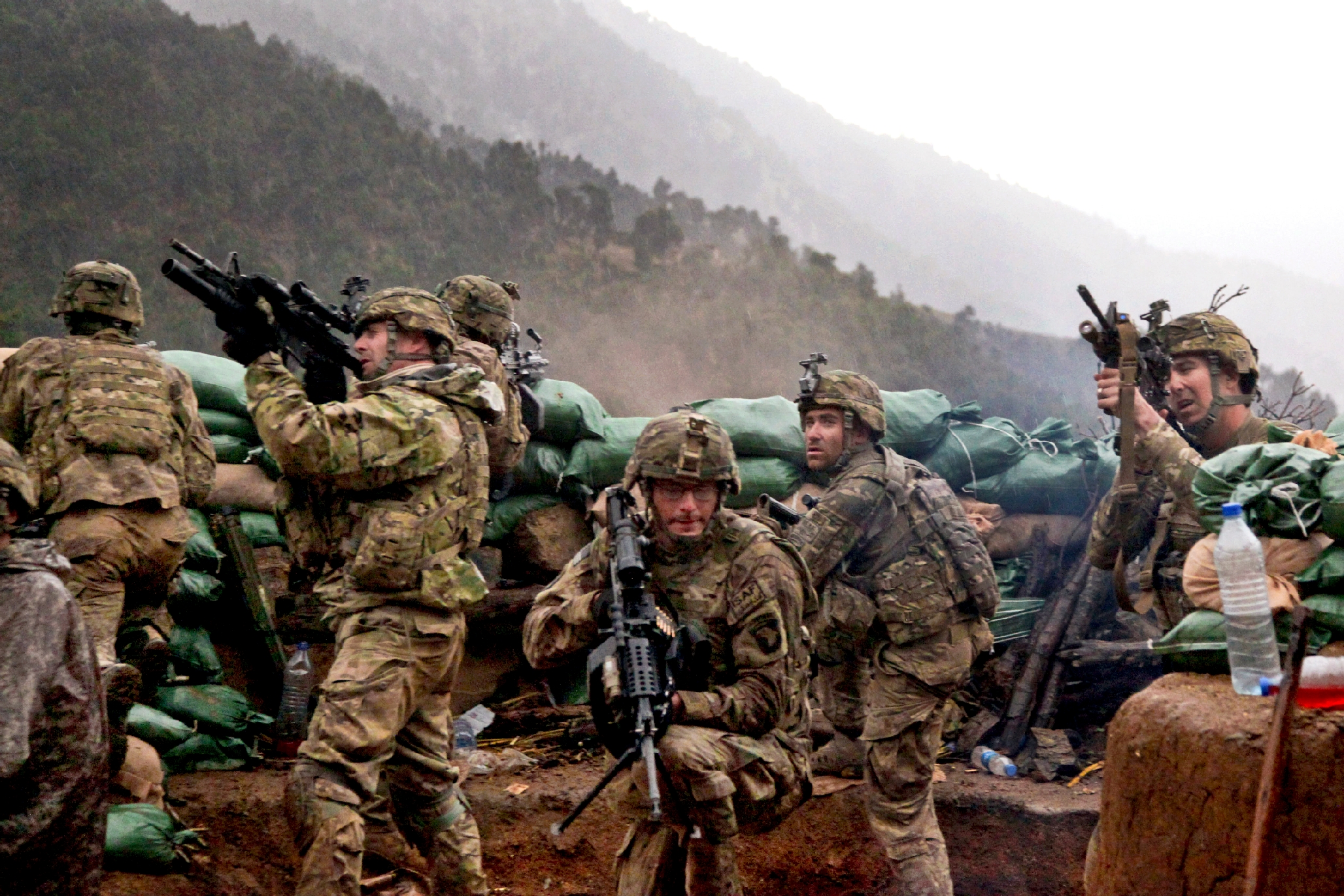
At War
Ashleigh Bryant
We had to beg, borrow, and steal for everything we had down there, and then kind of make our way throughout the rest of southern Afghanistan to try and get stories, shoot video. ...
I was the News Bureau Chief for American Forces Network-Kandahar. Basically, we were kind of internal embedded reporters. We would go out and embed with whatever platoon was going out and doing whatever. ...
I remember the first time we went to the step-off, that morning we got there, they went in earlier, early morning. We had kind of just pulled in. We had a group of, like, scout snipers with us. They all left in the back of the 7-Ton.
So we were just sitting there, and we started to get — we started to get shot at. That was the first time I had ever actually come under fire. And it was just kind of a sound I'll never really forget. I mean, it was so close you could see it, you know, pinging off the dirt. You could see the dirt flying up. ...
When we actually got further into the city, we got off the trucks and went into the city ... there was one lieutenant, and this guy looked at me and he’s like, “you know this is no place for a woman, right?” I was like, “you’ve got to be kidding me.” …
There was a point at which it got a little — it got a little dodgy. I remember I was filming. And I was watching these Marines go from one side of this clearing to the other. The videographer in me is like, ‘this is great footage, this so awesome, I can't wait to see what this looks like.’
And then — stop, and I'm like, ‘I have to do this. I have to go and run across this here clearing, and there’s a guy with a machine gun up there firing down at us, and I have to make it.’ ...
“That was the first time I had ever actually come under fire. And it was just kind of a sound I'll never really forget.”
I don't know if this is something that anyone will remember, but [on one mission] there was actually an AP reporter with us. And we were there when a kid named Bernard — Lance Corporal Bernard — he got hit with an RPG and got his leg blown off. ... He bled out before he even got back to the medics. But that was something she had actually gotten a picture of.
I understand, as a journalist, why she would take a picture of that. But to come back and — you know, she was asked — the AP was asked not to publish that photo. I believe Secretary Gates actually asked for that photograph not to be published, and they did it. And the family had requested that it not be published, and they did it anyway.
And that, you know, to — I guess to steal someone’s last moments like that, it kind of — I don't want to say it’s like Vietnam, but, you know, I mean it’s just a little too much. It’s a little too much.
And I don't think a large percentage of people here can appreciate what that’s like.
John Crawson
We were told we were cutting a road into a Taliban stronghold, and we got down to this small F.O.B. [Forward Operating Base], and we just took our gun trucks. And at one point, they wanted to park our gun trucks behind some trees and go out on a foot patrol to see where we were. …
And [the infantry unit] walked us out into this field, and it was a break in ... some grape rows … they’re basically mud walls about five feet high with grapes growing on them.
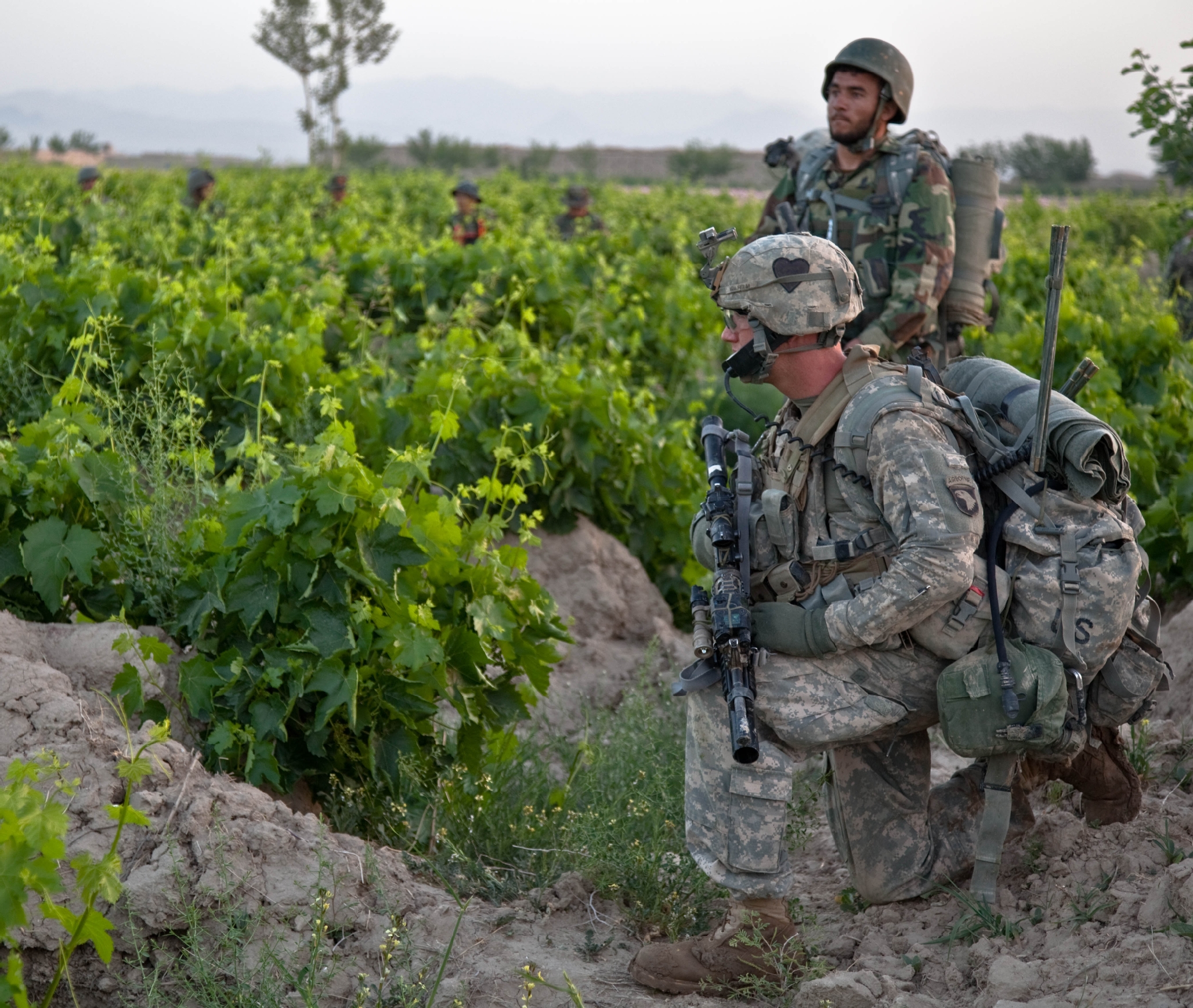
And then there was a break in this grape row, and it broke out into a wide open poppy field, and there was a ditch cut across there. And we saw some wires coming out of it, so we took a knee.
Everybody kind of sat down, and the infantry went up to check it and make sure it wasn’t an IED. After about 15 minutes of being there, an explosion happened. We were hit with an RPG blast, but it hit one of those grape rows, a pile of dirt. Nobody was injured. We returned fire, had a fire fight for about 30 minutes. …
You couldn’t see any — where we were, it isn’t like you would picture Afghanistan. It was, actually, it was really flush, green trees. … It looked like Vietnam movies to me. I mean, you couldn’t see anything.
There were trees everywhere, grass, everything. So we just returned fire, put some grenades their direction. And I guess after they shot, they probably took off, and, you know, the infantry looked at us and said, ‘Hey, y’all want to keep recon-ing this road?’ We said, ‘No, we've seen what we need to see. We'll get our equipment and be back tomorrow.’
So we left, and my platoon sergeant looked at me and he said, “Hey, I need as much experience as I can get on that dozer, so get in there, cut a road, turn around, and get out without being in there too long. Will you do it?” Of course I said yes.
That morning, next morning, we woke up. We went to our meeting that we always go to just to put out any information that we have, and I tell my guys the plan of action, which is if this happens, this is what we're gonna do. And if anything changes, I’ll get with you and make changes on the spot, but this is the plan we're going in with. I was going to drive the dozer over there.
We got over there. I went, I cut the road. It was only about 200 meters long. I turned to the sides — we’re in the middle of a poppy field — and I cut into the ground and made some berms for the infantry to hide behind so they could watch us while we’re doing our work.
“At that moment, I knew I had gotten shot.”
And it didn't take me long at all. I was probably out there 20 minutes on the dozer. And they love to hit dozers, because that’s one of our best pieces of equipment. That’s what does the most damage, so they’re always aiming at dozers, so I was expecting to get hit the whole time. You know, I was kind of tense but got it done. … I didn’t even have to talk to my guys because they knew, as soon as they saw me pull out, to start bringing dry dirt in to lay on top of the road with the two dump trucks that we had.
I would probably say 45 minutes into them bringing this dry-fill in, one of the dump trucks had a winch cable that came out from underneath it and was tangled up around the axle. So he was kind of at a standstill sitting out there in the middle of nowhere. So I jumped out with my platoon sergeant and my PL, and we told all of our soldiers to stay in equipment, ‘stay in your gun trucks, nobody needs to be on the ground that doesn't need to be there.’ So I was under the dump truck. …
We had just gotten [the cable] untangled, and we were about to wind it up when I stood up from the dump truck and an explosion happened. And I didn't know up from down.
I don’t know how long I was out. It could have been a second; it could have been a minute. But when I came to and could see and could hear again, I was on one knee, and I could see the enemies’ muzzle flashes shooting at us.
I was in a wide open field out there, so I dropped down onto my stomach and started crawling towards them because that gave me my best cover at the time. We were in a poppy field. Poppy is like four foot tall, so I was trying to crawl towards them to get behind that.
When I laid down, I could look up and I could see my gun truck. I couldn’t hear him, but he had a .50 caliber machine gun mounted up there, and I could see him just going to town with the .50 caliber machine gun. And I couldn't hear a thing, so I knew something was wrong, and it was just ringing. Everything was ringing. But I knew he was laying rounds down, so I wasn’t going to get up and run back there.
And as soon as I laid down and started crawling, I felt something skim over my shoulder, and it broke part of my body armor off. So at that moment, I knew I had gotten shot.
And they were putting a lot of lead down range, so I just crawled over a little farther to where I — there was kind of a small ditch in the middle of the field, and I just kind of laid there. I felt like I could have got up and ran at any time. I mean, I felt completely healthy, except my face hurt real bad. Felt like I had just been probably hit with a glass bottle across my lips.
The glasses that I was wearing were filled up with blood. There was blood all over the ground. My arm hurt a little bit like I’d hit it on something. My foot hurt a little bit like something had hit it, so I didn’t know to what extent I was injured at the time. ...
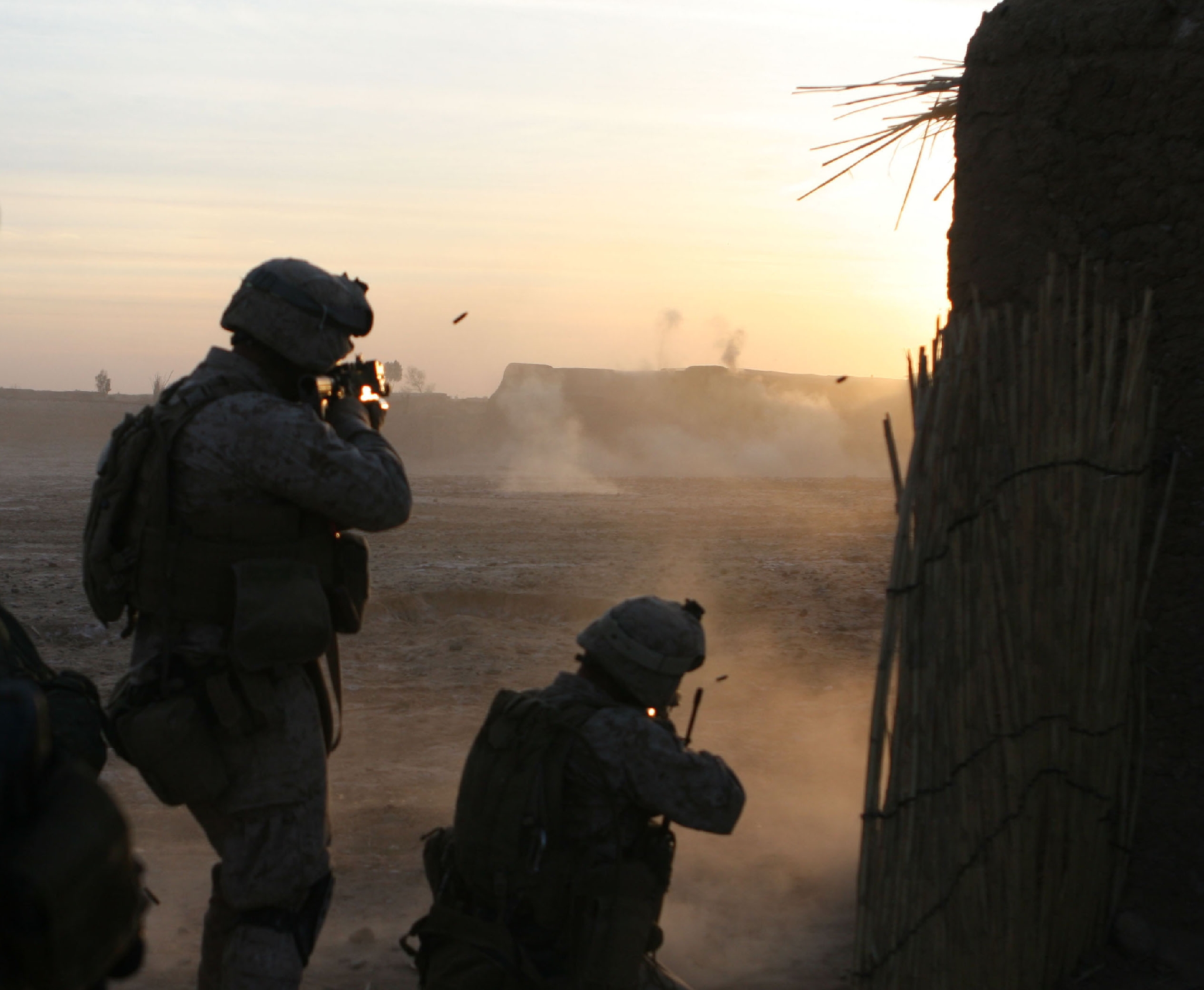
It was an RPG that hit that dump truck. I guess they hit where they were aiming at, and the RPG had to have flown three-to-four feet in front of my face to hit this truck.
And luckily, it was an armor-piercing round. If it had been a traditional RPG, I wouldn’t be having this conversation with you. But it was armor-piercing, so the blast was directionally-charged to go through the truck. I caught a bunch of shrapnel off of it, but nothing that, you know, caused any permanent damage, I don’t believe. It injured the two personnel in the truck — I still talk to them on Facebook. They were a couple of my soldiers. I kind of feel a little responsibility for them.
After the gunshot went through me, it just skimmed over my shoulder. It opened me up pretty good, but it never really caused any permanent damage. I had to have a skin graft done and everything, but it never really bothered me. It didn’t hurt my golf swing, so I’m okay with it. …
So I’m laying there, and after about 15 minutes, I guess the adrenaline starts wearing off, and I’m really starting to feel all the pain and … that's a long time. It felt like a lot longer.
“I had a long time to talk to God”
I had a long time to talk to God at the time and, you know, I was just asking him, ‘let me see my children again more than anything and just, you know, get me home, get me out of this situation.’
So I was laying there and after about 15 minutes — I was sure there was other injuries, so I would call for a medic every couple of seconds, whatever I could grunt out. I didn’t know if anybody could hear me, because I couldn't hear myself. So after about 15 minutes, they finally came. ... He rolled me over and he said a couple of bad words, and then he said, “Hey, we’re going to fix you up, Sergeant. Just lay still.”
At that time, they put tourniquets on my left arm and both my legs because I was bleeding pretty bad from all three of those limbs from the shrapnel wounds.
I had multiple, multiple deep shrapnel — “deep-tissue shrapnel wounds” is what the medics called it. Both my eardrums were messed up. They put me on a makeshift gurney, took me to the other side of the dump truck to get me, you know, hopefully out of harm’s way.
Then they tried to load me up into one of our gun trucks, but there’s not a whole lot of room in them, so they had to take me down. They put me in the back of an Afghan Army truck, which is basically like a little Ford Ranger. And at that point, I was like, ‘man, these guys can't drive. I'm a goner.’ So, you know, I was having a — trying to make the best of the situation.
They got me to the helicopter landing zone, and about five minutes later had me on a chopper and I was en route to Kandahar.
When I got on the chopper, they finally said, “Hey, we’re going to give you some morphine.” And to tell you the truth, the tourniquets hurt worse than anything else that had happened at the time. I mean, I don't know if you've ever had one on, but they stop the blood flow to your extremities, so it was starting to hurt a little bit.
I fell asleep as they were taking me off the chopper, and then I — they woke me up and I was in the hospital. And I remember the first thing I saw when I looked up, I was on the gurney, and I saw a doctor in there. And he had a — I don’t know what the doctors wear, the hat, but it was an Oklahoma Sooners hat. And I just — I’m a Sooners fan. And I just looked at him, smiled, and said, “Boomer Sooner,” and he started laughing. And then he asked me to tell him what happened.
And I fell asleep again, and then I woke up and they were putting me through an MRI/CAT scan machine thing, some big tube, sliding me in and out of it.
And then I fell asleep again, and then I woke up the next day in my room in the hospital bed. ... All kind of tubes going everywhere. My lips were — I mean, the explosion had messed up my face pretty bad. All my lips were — just felt like I had been in a bar fight, I guess. I was so thirsty, but they wouldn’t let me drink anything.
But then I would fall asleep here and there. And then I woke up at one point and my platoon leader and my platoon sergeant were there. And I didn’t know how they had gotten there, because it’s hard to get a ride over there anyways. But I was glad that they were there …
Most of the people that I’ve ever served with — you can tell when you get the ones that you want to serve with, and the ones you would rather them just send home. But most of them are good people, and you would lay your life down for them (and vice-versa) at any time.
John Hintz
It was different completely than Iraq. I think that what I expected out of Iraq I didn’t get — it was all fighting IEDs. And then when I went to Afghanistan, that was war.
You’re in the mountains. There were times where I was on the ground with 50 men of my own, facing 80 men that were Taliban in extremely long firefights — they could last up to two days.
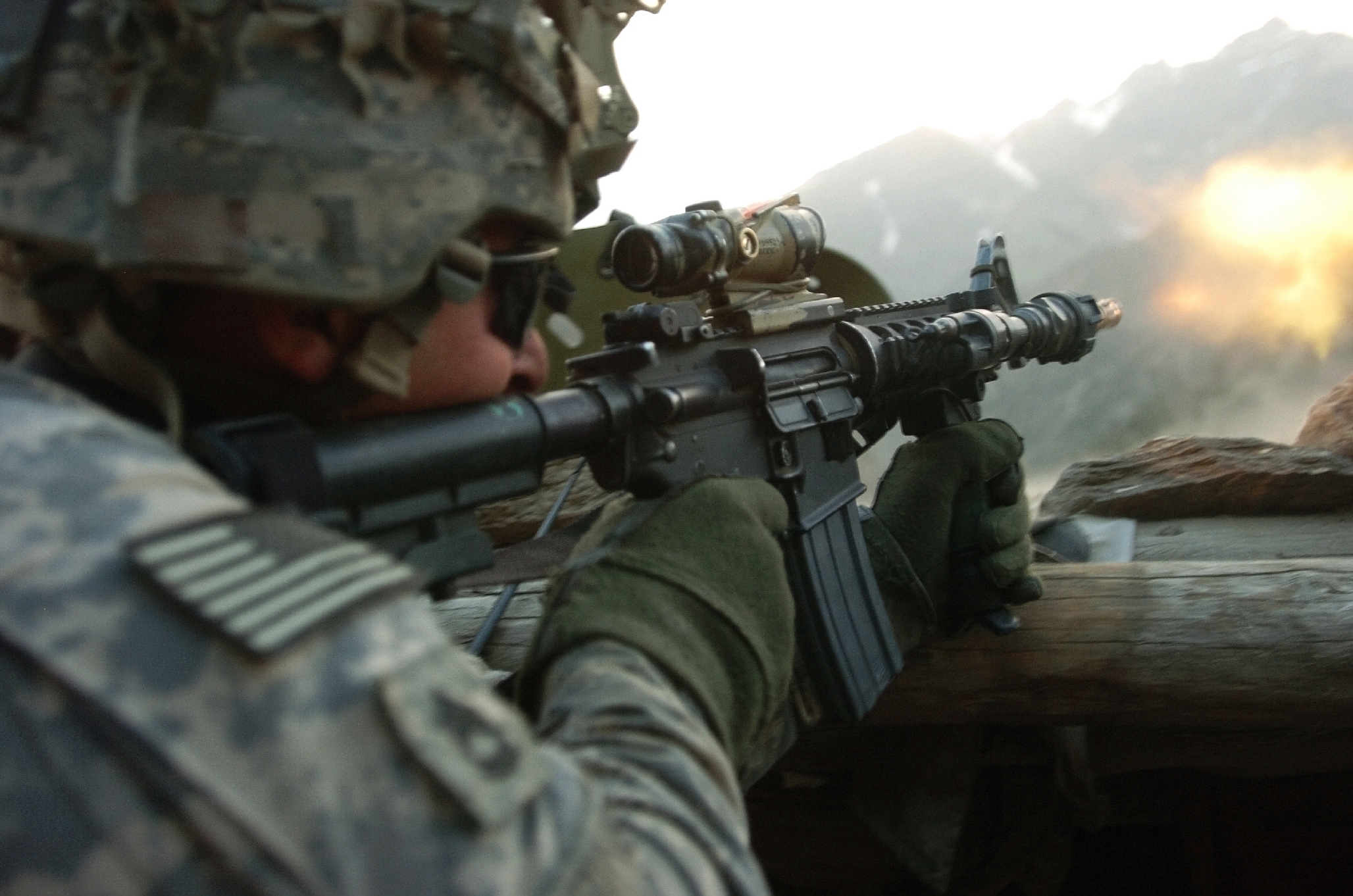
We got ambushed on one patrol out in the mountains … Naka was the name of the town. We knew that we were traveling a mountain range out. Well, what they knew was that mountain range stopped on a low ground, and when it stopped, it was completely surrounded by mountains.
So they went out there, and they knew we were heading that direction. They set up for us. There was probably 80 Taliban fighters in a ‘U’ shape on the high ground, and as we came out of a clearing, we knew we were now in trouble. We were on the low ground, and instantly they attacked us. ... They maneuvered fighters behind us and had us completely circled.
I stood up right off the bat because all the gunfire was coming at us, and I wanted to see it. Probably not the smartest decision, but it’s one of the things I did in combat was I would like to stand up and look around. I saw that we were completely surrounded.
“I heard the screams for medic. This was on Mother's Day. That's why I remember this.”
So right off the bat, we have Specialist Lopez is shot through the leg. We have another individual who’s injured from an RPG blast. So we bring those guys to the center of the perimeter.
I tighten our perimeter to where it’s a circle because I know we can get attacked from everywhere. And I start to identify the enemy. That’s my job. I’ve got my soldiers that are shooting at the enemy, but my job is now to pinpoint where they need to shoot. And so that’s what I started to do, and I got on the radio and started to call for air support and medivac because we had two seriously injured individuals. And then we had the Afghan Army with us at that time on that patrol. We had 20 Afghan soldiers, and two of them were shot. So right off the bat we've got all our medics occupied with four injured and we just started to fight. …
In the mountains, the helicopters don’t land. They fly in and they use what’s called ‘jungle penetrators’ — they actually drop on a line a medic to you. They drop him on the ground; they fly away. He has a basket with him. He now gets the individual in a basket. The helicopter will fly back around, drop their line to you. You secure it to the basket, and it hoists the injured soldier, along with the medic, back up to the helicopter.
I mean, one of the most impressive things I saw in combat was the medics that flew out. Those helicopter pilots were unbelievable. Fearless.
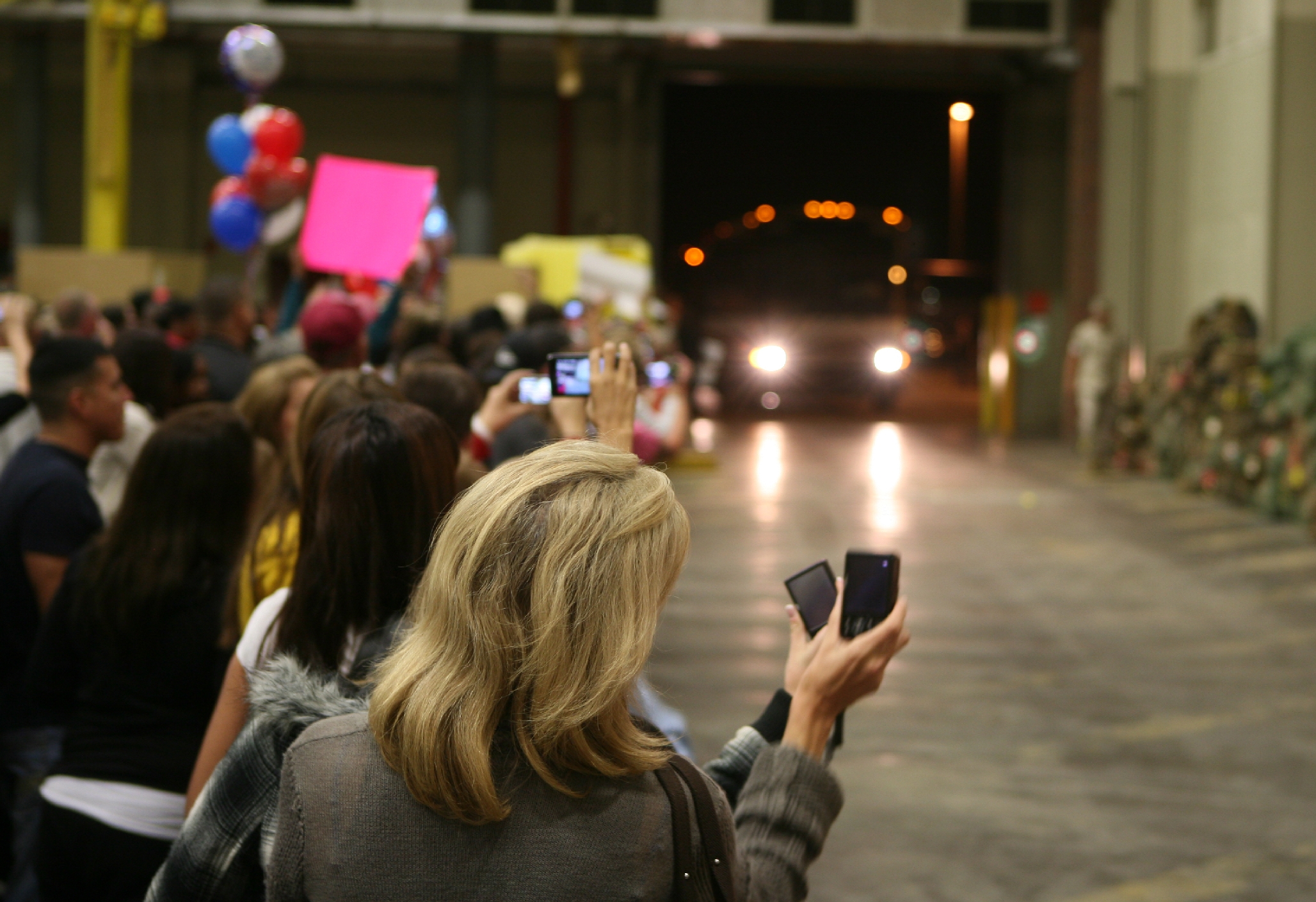
Life after War
Mark D. Becker, II
[War] makes you appreciate everything that you have when you’re back here at home in America, but it also makes you see in a different, in a whole new set of eyes. Every perspective changes completely when you go to war and come back home. You’re on edge, you have a lot ... You’re more attentive to your surroundings because it’s just the way you have to be over there or it could cost you your life. ...
Coming back was really, really strange, because even in just six months, everything changes. A lot of things change in six months.
And you come back, and you expect everything to be the same — you expect everybody to be the same as they were before, and they're not. It's all different.
And you go from that big — you go from that quick hot tempo to slow progress back home. … You’re like a small cog in a huge machine. And you come back and things are just kinda ... everything else is laid back. ...
‘You come back, and you expect everything to be the same. It's not.’
It’s bad to come back from war and everything's changed, but it’s even worse to not to come back. There were a few people over there that I knew that I lost. They weren't in my unit — thank God that everybody in my command came back with all ten fingers and all ten toes — but there were some people I did meet while I was over there who died ... lost their lives in combat serving their country. ...
I did almost five [years] serving my country. ... I’m going to college now, and there’s not a whole lot of people I’ve met who can say that they’ve been where I’ve been and done what I've done. ... I mean I’m only, I’m 23. A lot of, you know, 23-year-old college juniors, seniors that, that can’t even hold a candle to my experience in life.
It’s really life-changing. I gained a lot. I took the core values, the Navy core values and I applied it to my life: honor, courage, and commitment; being an honorable person; having courage to stand up for what is right and do it through — and that’s what I did.
Ashleigh Bryant
When I came back after Afghanistan, I actually — I did the Susan G. Komen 60-mile walk. A lot of it was along roadsides. And I just remember everything I looked at was, like, ‘that can be an IED, that could be’ and it didn't go away for a long time. It was just something that stuck in my head.
You’re constantly watchful. I know I'm back on U.S. soil. I know that people are not putting bombs on the side of the road. But you still look for it. You still wait for it. …
Every general leadership position always kind of talks about ‘cautious optimism.’ And I think that’s really the best way to put it. Yeah, it would be great if [Afghanistan] would turn around. It would be great if everything would be the way we want it to be after so much — so much loss, after so many people have put so much into this and lost so much over it. ... In the pit of my stomach, I guess I don't feel like that’s going to be the case.
John Crawson
Everybody asks us why we’re fighting over there, why we do what we do. And our best answer, or best one that I’ve come up with, is that ... we’re fighting over there so that they don’t come over here and fight here. ...
I think I speak for everybody else when I say, I mean, we’re proud to do it and proud to — we do it for the people that don't want to or aren’t willing to, you know. We’re just really proud to do it, and we don’t hold anybody in low regard. My brothers, they never decided to join, and we do it so they don't have to join. That’s their option. …
I don’t think I would want my children being in the military. I want them to support it. I just don't want them to be in it, I don't think.
James Martin Grace, Jr.
You know, I’d always struggled with whether this was self-sacrificing or self-gratifying. You know how much I’ve always wanted to do it, but it was incredibly inconvenient and dislocating to my family. As long as it was an opportunity that I could help out in a meaningful way, I felt like it was self-sacrificing.
Everyone’s called to serve the country, serve your society in some fashion. And it can be doing Little League or Girl Scouts, or it can be as prosaic as just paying your taxes on time. Everyone must serve in some fashion. Some men and women are actually called to serve military service. They feel it within them.
Patton used to say that there are only two true callings: the priesthood and the military. And he really, really used to pray every night that he wouldn't be called to the priesthood, because he really wanted to be a soldier. And I don’t believe that there's only two true callings, but I do think that some people are called to military service. I think I’m one of those people.
John Hintz
I lost nine soldiers in combat. Their memory drives everything I do in and out of the Army.
I think that you owe it to every young American who is killed in defense of our country to just do whatever you can as a service member, so that's what drives me.
I wear it on my wristband, so their names are very important to me, and that’s what will continue to push me.
Steven Joseph Hyde
Today, I look at everything in the face of eternity, and there isn't much that really matters. You know, I see people — we call it ‘pole-vaulting over mouse turds’ — making a mountain out of a molehill. And I look at it and I ask myself, “in the face of eternity, what does that really matter? Is it really going to make a difference?” If the answer is yes, then I give it my all, and I dedicate myself to it. If it's not, just move on. You know, just move on.
Military service comes at a cost. ... I missed class plays. I missed dance recitals. I missed a lot of things for my kids. I made as many as I could, but I did miss some. And those that you miss, you’ll never get them back.
I didn’t understand survivor guilt. I didn’t understand all that, but I do now.
* * *
Curated by Zack Stanton, the editor-in-chief of The Wilson Quarterly.
These firsthandhese firsthand accounts have been abridged for brevity and readability. Full transcripts of all interviews are available at http://www.loc.gov/vets/
The Wilson Quarterly would like to thank the Veterans History Project for their generosity in allowing us to share these stories, and their enormous public service in recording our veterans’ firsthand experiences for future generations. WQ also extends its appreciation to Megan Harris, Reference Specialist at the Veterans History Project, for her help and guidance.
Cover photo courtesy of the U.S. Army
